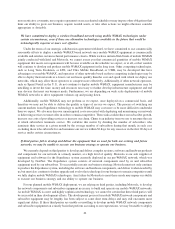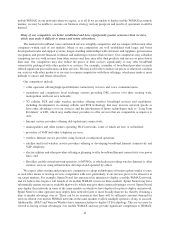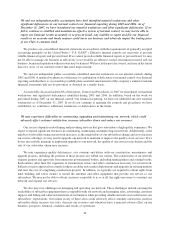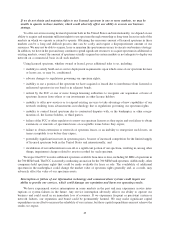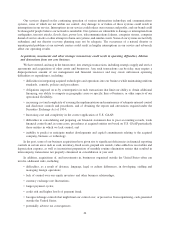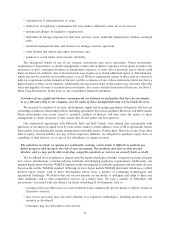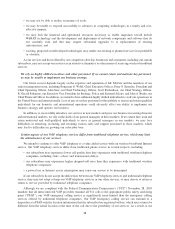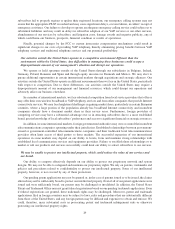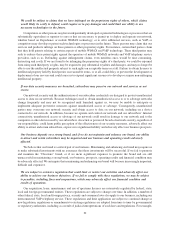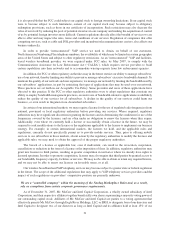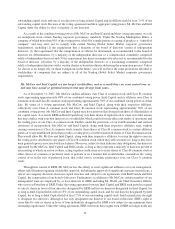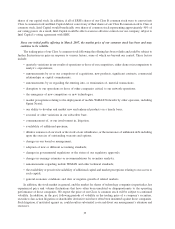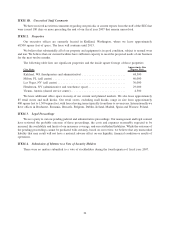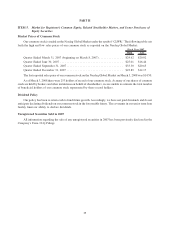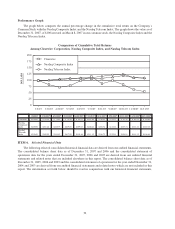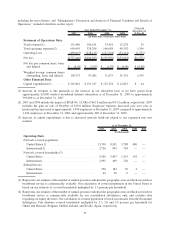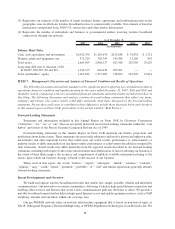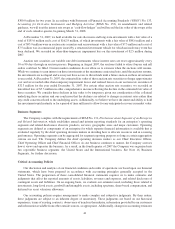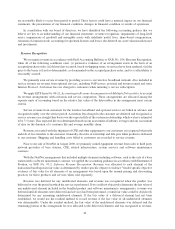Clearwire 2007 Annual Report Download - page 40
Download and view the complete annual report
Please find page 40 of the 2007 Clearwire annual report below. You can navigate through the pages in the report by either clicking on the pages listed below, or by using the keyword search tool below to find specific information within the annual report.outstanding capital stock and one of our directors as long as Intel Capital and its affiliates hold at least 7.5% of our
outstanding capital stock. Because of the voting agreement and their aggregate voting power, Mr. McCaw and Intel
Capital share the ability to elect a majority of our directors.
As a result of the combined voting power of Mr. McCaw and Intel Capital and their voting agreement, we rely
on exemptions from certain Nasdaq corporate governance standards. Under the Nasdaq Marketplace Rules, a
company of which more than 50% of the voting power is held by a single person or a group of people is a “controlled
company” and may elect not to comply with certain Nasdaq Global Select Market corporate governance
requirements, including (1) the requirement that a majority of the board of directors consist of independent
directors, (2) the requirement that the compensation of officers be determined, or recommended to the board of
directors for determination, by a majority of the independent directors or a compensation committee comprised
solely of independent directors and (3) the requirement that director nominees be selected, or recommended for the
board of directors’ selection, by a majority of the independent directors or a nominating committee comprised
solely of independent directors with a written charter or board resolution addressing the nomination process. Unless
we choose to no longer rely on these exemptions in the future, you will not have the same protections afforded to
stockholders of companies that are subject to all of the Nasdaq Global Select Market corporate governance
requirements.
Mr. McCaw and Intel Capital are our largest stockholders, and as a result they can exert control over us
and may have actual or potential interests that may diverge from yours.
As of December 31, 2007, Mr. McCaw and his affiliates own Class A common stock and Class B common
stock representing approximately 48% of our combined voting power. Intel Capital and its affiliates own Class A
common stock and Class B common stock representing approximately 30% of our combined voting power as of that
date. By virtue of a voting agreement, Mr. McCaw, and Intel Capital, along with their respective affiliates,
collectively own Class A common stock and Class B common stock representing approximately 78% of our
combined voting power. Mr. McCaw and Intel Capital may have interests that diverge from those of other holders of
our capital stock. As a result, ERH and Intel Capital may vote their shares of capital stock to cause us to take actions
that may conflict with your best interests as a stockholder, which could adversely affect our results of operations and
the trading price of our Class A common stock. Further, under the provisions of our fourth amended and restated
certificate of incorporation, Mr. McCaw and Intel Capital, along with their respective affiliates, may, without
causing conversion to Class A common stock, transfer their shares of Class B common stock to certain affiliated
parties or to any unaffiliated party that provides a voting proxy over the transferred shares of Class B common stock.
This would allow Mr. McCaw and Intel Capital, along with their respective affiliates, to retain the right to exercise
the voting power attributed to any shares of Class B common stock which they sell or transfer so long as they have
been granted a proxy associated with such shares. Moreover, subject to their fiduciary duty obligations, the directors
appointed by Mr. McCaw, Intel Capital and Bell Canada, so long as they represent a majority of directors present at
any meeting at which an action is taken, acting together could cause us to issue shares of Class B common stock or
other classes of common or preferred stock to persons or in a manner that would further concentrate the voting
control of or, in the case of preferred stock, that could convey economic preferences over, our Class A common
stock.
Through his control of ERH, Mr. McCaw has the ability to exert significant influence over our management,
affairs and all matters requiring stockholder approval, including the approval of significant corporate transactions, a
sale of our company, decisions about our capital structure and, subject to our agreements with Bell Canada and Intel
Capital, the composition of our board of directors. Furthermore, in addition to Mr. McCaw, certain members of our
management team are employed by, or have interests in, ERH, including Mr. Wolff, our Chief Executive Officer,
who serves as President of ERH. Under the voting agreement between Intel Capital and ERH, each party has agreed
to vote its shares in favor of four directors designated by ERH and for two directors designated by Intel Capital, for
so long as Intel Capital holds at least 15% of our outstanding capital stock, and for one director designated by Intel
Capital, for so long as Intel Capital holds at least 7.5% of our outstanding capital stock. Intel currently has the right
to designate two directors, although it has only designated one director to our board at this time. ERH’s right to
cause Intel to vote its shares in favor of four individuals designated by ERH is not subject to any minimum share
ownership requirement. Under the voting agreement, ERH will retain these rights even if ERH no longer holds any
32


